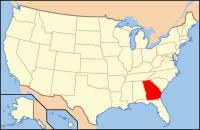Fayette County, Georgia
| Fayette County, Georgia | ||
|---|---|---|

Fayette County Courthouse in Fayetteville
|
||
|
||
 Location in the U.S. state of Georgia |
||
 Georgia's location in the U.S. |
||
| Founded | May 15, 1821 | |
| Named for | Marquis de Lafayette | |
| Seat | Fayetteville | |
| Largest city | Peachtree City | |
| Area | ||
| • Total | 199 sq mi (515 km2) | |
| • Land | 194 sq mi (502 km2) | |
| • Water | 5.0 sq mi (13 km2), 2.5% | |
| Population (est.) | ||
| • (2015) | 110,714 | |
| • Density | 548/sq mi (212/km²) | |
| Congressional districts | 3rd, 13th | |
| Time zone | Eastern: UTC-5/-4 | |
| Website | www |
|
Fayette County is a county located in the north central portion of the U.S. state of Georgia. As of the 2010 census, the population was 106,567. Fayette County was established in 1821. The county seat, Fayetteville, was established in 1823. Much of Fayette County is bordered on the east side by the Flint River.
Fayette County was organized in 1821 after the United States signed a treaty at Indian Springs, Georgia with the Creek people for cession of a large portion of their land. The county and its seat, Fayetteville, were both named in honor of the French aristocrat the Marquis de Lafayette, who aided General George Washington in the American Revolutionary War.
Since the late 20th century, Fayette County has been part of the Greater Atlanta Metropolitan Area. It is located south of Atlanta, which is based in Fulton County. Fayette County is minutes from Hartsfield-Jackson International Airport. As a suburb of Atlanta, Fayette County has increased rapidly in population and development since the late 20th century, nearly doubling its population since 1990.
Both the county commission and the school board were elected members at-large from the county. The school board was one of only 20 boards, out of 180 in Georgia, that followed this system. Plaintiffs from the NAACP filed suit in 2011, charging that the system diluted their voting power, preventing the minority, who comprise 20% of the population, from electing candidates of their choice. The judge ruled in their favor and in 2013, a system of single-member voting was established, which the county and school board appealed. In 2014 the first African Americans were elected to the county commission and school board. In January 2016, the county and school board voted to settle the suit, as supported by the Chamber of Commerce. They have negotiated a system of four seats to be elected by single-member districts, with one at-large seat.
...
Wikipedia

